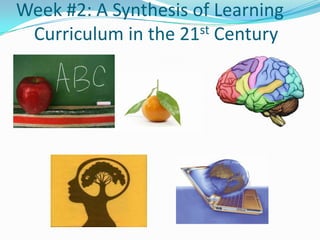
Week 2 curriculum in the 21st century-2013
- 1. Week #2: A Synthesis of Learning Curriculum in the 21st Century
- 2. Purpose: We will be focusing on synthesizing what we have learned about the knowledge, skills, attributes of quality teaching and apply this to what we know about the 21st century classroom. Critical Evidence: Chapter Presentations, Movie Trailers, Chapter Brochures, Course Participation Task #2: Our Symbaloo, Task #2: Article Critiques Required Reading: Chapters 1, 2, 3 & 4: How to Integrate the Curricula Review: Chapters 1, 2, 3,& 4: Beyond Monet Movie Trailer Exemplar: http://www.youtube.com/watch?v=i6UDrXB1Zk
- 7. The Quality Teaching Document defines the end….and the beginning Alberta Education: http://education.alberta.ca/media/ 311294/421.pdf
- 9. Understanding by Design….in real life A Wedding Building a house Planning a family Planting a garden Shoveling the driveway Planning a trip Raising children Getting a Master’s Degree
- 10. What is the 1st thing you do?
- 12. Think Big Rocks Sand Water
- 17. Symbols, Models and Frameworks of learning and schools Compare and Contrast Finish the sentence: Schools are like _______________________because ________________________________________________ Learning is like _______________________because ________________________________________________ A symbol of learning/schools today is _______________ because_________________________________________ Videoclips: Old Thinking: http://www.youtube.com/watch?v=1ZnS8SEfcxM New Thinking: http://www.youtube.com/watch?v=zDZFcDGpL4U
- 27. Curriculum Questions What is Curriculum? Who decides what curriculum is taught? Why do we study the specific subjects we do, in the way we do, and test them as we do? What influences how curriculum changes? Where do present schooling practices come from? To What questions are schools the answers? How do different societies educate their young?
- 28. Curriculum: Now and Then Curriculum Experts: John Dewey Ralph Tyler Jerome Bruner John Franklin Bobbit Egerton Ryerson Paulo Freire Nel Noddings Eliott Eisner Timeline Activity How far have we progressed?
- 29. Shifting “Curricular” Paradigms Traditionalism Progressivism 1. Where do you put “constructivism” and “behaviorism”? 2. Where would you put “junior high philosophy” and “middle school philosophy? 3. Where would you put “teacher directed curriculum” and “student directed curriculum”? 4. What have been the patterns in Canada’s history? 5. Where are we in Alberta? The rest of the World? 6. Where would you put “YOU”? 7. Thinking Differently for the Future: Sir Ken Robinson http://www.youtube.com/watch?v=zDZFcDGpL4U
- 30. How have these incidents impacted curriculum? October Sky: How does this student experience the prescribed curriculum?
- 31. More Curriculum Questions How will you teach todays digital natives when they come to you in middle school? (Remember Bridger) What will children need to know 10 years from now (or 25 years from now)? What defines if a student is successful? What is academic success? Who should measure it? How often should it be measured? Who should be involved in curriculum development? Who should evaluate curriculum? What do today’s students say about the curriculum?
- 32. Retrieved from “What did you do in school today?”, Canadian Education Association, 2009
- 34. Secondary Very Often Often Sometimes Very Seldom Elementary
- 35. 1st 2nd 3rd 4th 5th Why are these rated as less effective? Do we abandon these or just do them better?
- 36. 1st 2nd 3rd 4th 5th Why are these rated as less effective? Do we abandon these or just do them better?
- 37. Are we teachers? Determining the learning destination Creating questions that foster inquiry Designing units, backwards Determining assessment evidence Recognizing the benefits of performance criteria or are we designers? Architects of instruction? Facilitators of learning?
- 38. Unit Title: Grade: Subject, Topic: Time: Stage 1 – Desired Results Learning Target(s): Critical Questions: Students will understand that… Students will know… Students will be able to… Stage 2 – Assessment Evidence Formative Assesssments: Summative Assessments: Stage 3 – Learning Plan Learning Activities: High Yield Strategies: Accommodations: Differentiation:
- 42. Curriculum: The Future and You What kind of curriculum experience will you design? Will your curriculum address the essential understandings and learning outcomes of the program of studies? Will your curriculum plan inspire, motivate, and engage students? Will your curriculum allow for collaboration? Will your curriculum meet the needs of the 21st century learner? Will your curriculum demonstrate creativity and innovation in teaching and learning?
- 43. Nel Noddings Critical Lessons: What our schools should teach? We cannot solve our problems with the same thinking we used when we created them. Albert Einstein
- 44. Poll Everywhere: Poll #1
- 45. Poll Everywhere: Poll #2
- 46. Simulation: What if? Bad News: Due to years of ignoring the warnings of impeding catastrophe due to global warming, the Earth is collapsing in a series of extreme weather in the form of blizzards, hurricanes, drought, floods, and destructive tornadoes. Good News: You have been selected to join a blended team of scientists, geologists, philosophers, medical personnel, and yes, even politicians to venture to a new “Earth-like planet” to set up our first interplanetary colony. We will have approximately 10,000 people including families and children. Because of your expertise in curriculum foundation and inquiry, you have been chosen as our education team to devise a new curriculum that will be used for teaching the new children of our first colonists, as well as all of the future children that will arrive. Design a curriculum that is based on five key principles (subjects, topics, structure, delivery, content, etc.) that will honor our past, and guide our future success. Good luck citizens – you have five minutes to accomplish your mission.
- 47. Critical Lessons for our Times What are the critical lessons we need to teach our students today? Where is the place for teaching critical lessons within our curriculum? What is the best way to do this? How do we treat this in an “Alberta” context? Why should we (if we should) integrate critical lessons into our curriculum?
- 48. Curriculum in the 21st Century